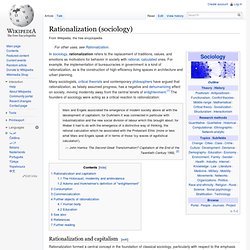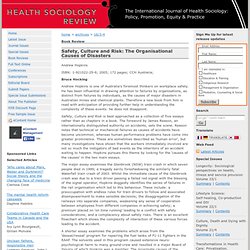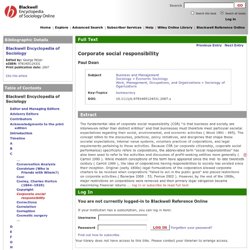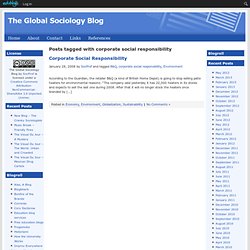

Rationalization (sociology) In sociology, rationalization refers to the replacement of traditions, values, and emotions as motivators for behavior in society with rational, calculated ones.

For example, the implementation of bureaucracies in government is a kind of rationalization, as is the construction of high-efficiency living spaces in architecture and urban planning. Many sociologists, critical theorists and contemporary philosophers have argued that rationalization, as falsely assumed progress, has a negative and dehumanizing effect on society, moving modernity away from the central tenets of enlightenment.[1] The founders of sociology were acting as a critical reaction to rationalization: Rationalization formed a central concept in the foundation of classical sociology, particularly with respect to the emphasis the discipline placed – by contrast with anthropology – on the nature of modern Western societies.
Weber believed that a move towards rational-legal authority was inevitable. Encyclopedia.com articles about Sustainable development. Safety, Culture and Risk: The Organisational Causes of Disasters - Health Sociology Review. Book Review Safety, Culture and Risk: The Organisational Causes of Disasters Andrew Hopkins ISBN: 1-921022-25-6; 2005; 172 pages; CCH Australia; Bruce Hocking Andrew Hopkins is one of Australia's foremost thinkers on workplace safety.

Safety, Culture and Risk is best approached as a collection of five essays rather than as chapters in a book. The major essay examines the Glenbrook (NSW) train crash in which seven people died in 1999; a tragedy eerily foreshadowing the similarly fatal Waterfall train crash of 2003. A shorter essay examines the problems which arose from the ‘deseal/reseal' program for repairing the fuel tanks of F1-11 fighters in the RAAF. Two brief theoretical essays, one on ‘Quantitative Risk Assessment' and the other on ‘Risk Society' help round out the collection.
University of Zurich » Department of Business Administration Home | Contact | Sitemap | Deutsch About us Study Research Executive Education and Services URPP Social Networks Faculty Press Libraries jobs@business Neuste Publikationen UZH Business Insight Die dritte Ausgabe ist erschienen.

Wirtschaftswissenschaftliche Fakultät Dekanat der Wirtschafts-wissenschaftlichen FakultätInstitut für Banking & FinanceInstitut für VolkswirtschaftslehreInstitut für InformatikFachverein Oekonomie Executive Education and Services The objective of the Department of Business Administration (IBW) is to put the research results into practice Therefore, in addition to cooperative endeavours in research, we offer internationally recognised training and advanced training courses and guarantee excellently trained junior employees to industry. Corporate social responsibility : Blackwell Encyclopedia of Sociology : Blackwell Encyclopedia of Sociology Online. The fundamental idea of corporate social responsibility (CSR) “is that business and society are interwoven rather than distinct entities” and that businesses must therefore meet particular societal expectations regarding their social, environmental, and economic activities ( Wood 1991 : 695).

The concept refers to the discourses, practices, policy initiatives, and disciplines that shape these societal expectations, internal value systems, voluntary practices of corporations, and legal requirements pertaining to those activities. Because CSR (or corporate citizenship, corporate social performance) specifically refers to corporations, the abbreviated term “social responsibilities” has also been used to refer to the activities and discourses of profit-seeking entities more generally ( Carroll 1999 ). Your library does not have access to this title. Please contact your librarian to arrange access. Health and Safety cuts: Criminal businesses let off the leash. Steve Tombs is Professor of Sociology at Liverpool John Moores University, and David Whyte is Reader in Sociology at the University of Liverpool; they are authors of Regulatory Surrender, published by the Institute of Employment Rights As we pointed out in an earlier article on Left Foot Forward, the Health and Safety Executive (HSE) now inspects a third of the workplaces it did a decade ago.

Moreover, the regulator investigates a paltry third of safety offences, and prosecutes less than half of the offences, than it did a decade ago. As we said: hardly a picture of health and safety gone mad, nor of bureaucracy holding back business or the economy. Rather, it is a picture of institutionalised impunity for some pretty serious offences. The chances of being prosecuted for killing a worker have fallen by around 40 per cent since 2000. The chances of being prosecuted for causing a serious injury, such as an amputation, or blinding a worker, are now hardly worth mentioning. Corporate social responsibility. Corporate Social Responsibility.

07-2003.doc.